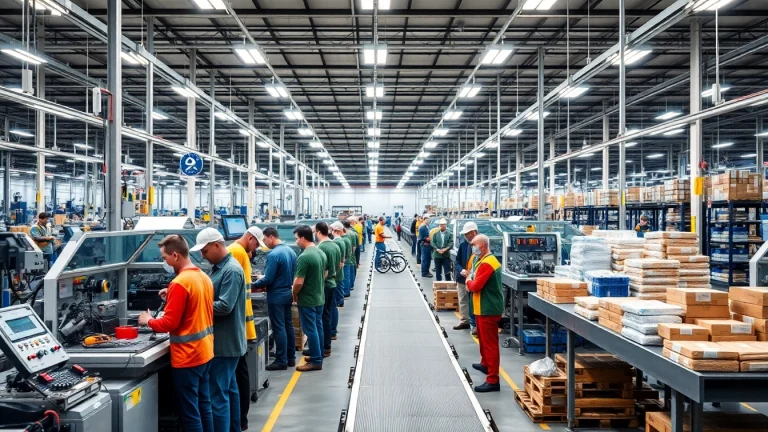
Finding Reliable Manufacturers: Strategies for Successful Partnerships
Understanding the Role of Manufacturers in Industry
Definition and Importance of Manufacturers
Manufacturers are entities or individuals engaged in the process of converting raw materials into finished goods through various forms of labor, machinery, and processes. Defined officially, a manufacturer is “a person or company that makes goods for sale” – a pivotal role in the economy, serving multiple industries from consumer products to industrial machinery. This sector is foundational, as manufacturers not only create jobs but also stimulate economic growth by contributing significantly to GDP. According to the National Association of Manufacturers, manufacturing is directly responsible for 8.5% of the U.S. economy, demonstrating its necessity.
Types of Manufacturers and Their Services
Manufacturers can be categorized into several types based on their operational processes:
- Discrete Manufacturers: These manufacturers produce distinct items that can be counted, touched, or seen. This includes products like cars and electronics.
- Process Manufacturers: Unlike discrete manufacturers, these create products through a continuous process and typically can’t be broken down into individual items without altering the product, such as refined oil or beverages.
- Job Shop Manufacturers: They produce low volumes of customized goods. Each job is typically unique, unlike mass production which strives for uniformity.
- Batch Manufacturers: They produce goods in batches, which allows for flexibility and customized offerings while not sacrificing efficiency.
The services these manufacturers provide can span from product design and prototyping to logistics and distribution, making them essential partners in the supply chain. For businesses looking to partner with manufacturers, understanding these types assists in aligning their specific needs with the right manufacturer.
Challenges Faced by Modern Manufacturers
Modern manufacturers face numerous challenges that can hinder their operations. Some of these challenges include:
- Supply Chain Disruptions: Events like global pandemics or geopolitical tensions often cause delays in the supply chain, making it challenging to source materials timely.
- Labor Shortages: Manufacturers are experiencing difficulties in recruiting skilled labor, which affects productivity and quality.
- Technological Advancements: Keeping up with rapid advancements in technology requires significant investment and can be a steep learning curve for existing staff.
- Sustainability Pressures: With increasing concern over environmental impacts, manufacturers are pushed to adopt more sustainable practices, which can involve complex redesign processes or investments in eco-friendly materials.
How to Identify Suitable Manufacturers for Your Needs
Researching Potential Manufacturers Effectively
The process of finding the right manufacturer begins with thorough research. It’s critical to consider factors such as location, ability, reputation, and product specialization. Potential methods include:
- Utilizing online platforms and directories to find specific manufacturers in your industry, checking reviews and their operational standards.
- Networking within industry associations or attending trade shows, which provide opportunities to evaluate manufacturers face-to-face.
- Online searches targeted to specific needs or industry requirements, such as looking for manufacturers who specialize in sustainable practices.
Evaluating Manufacturer Capabilities and Credentials
Once potential manufacturers are identified, due diligence is essential. Evaluations should focus on:
- Certifications: Verify any necessary industry certifications that demonstrate a manufacturer’s compliance with standards, such as ISO certifications.
- Technological Infrastructure: Assess if they are equipped with modern machinery and technology that signifies efficiency and quality.
- Financial Health: A manufacturer’s financial stability can indicate its ability to sustain operations and invest in improvements.
- Production Flexibility: Understanding their ability to accommodate changes in order sizes and deadlines can protect you during fluctuations in demand.
Understanding Manufacturer Contracts and Agreements
When entering a partnership, clear agreements are paramount. Contracts should cover:
- Scope of Work: Clearly defined products, quantities, quality specifications, and timelines help avoid confusion.
- Payment Terms: Establish when payments are due and accepted forms, safeguarding both parties financially.
- Confidentiality Clauses: Protect sensitive information regarding products, designs, and business practices.
- Dispute Resolution: Clearly outline how potential conflicts will be managed to minimize disruptions to production.
Building Strong Relationships with Manufacturers
Strategies for Effective Communication
Successful manufacturing partnerships rely heavily on communication. Effective strategies include:
- Regular Updates: Establish a routine for communication that includes updates on production status and any potential concerns.
- Utilizing Technology: Implementing project management and communication platforms that allow for transparent and efficient information sharing.
- Feedback Loops: Encouraging open feedback helps maintain quality and foster trust between both parties.
Nurturing Long-Term Partnerships with Manufacturers
Long-term partnerships yield significant benefits such as better pricing, prioritization during busy times, and refined processes. To nurture these relationships:
- Adaptability: Be open to adjusting terms based on evolving market conditions that could benefit both sides.
- Investment in Relationships: Engage in regular visits to manufacturing facilities or joint training sessions that foster a sense of partnership.
- Recognizing Achievements: Acknowledge and celebrate the successes that arise from your cooperation, solidifying the bond.
Resolving Conflicts and Issues with Manufacturers
Conflicts may arise for numerous reasons, such as differing expectations. Effective resolution strategies include:
- Proactive Approach: Address issues as they arise rather than allowing them to fester, encouraging a quicker resolution.
- Focus on Solutions: Work collaboratively to find compromises that respect both parties’ interests.
- Mediation: In extreme cases, consider involving a third party to mediate and provide neutral insights.
The Future of Manufacturing: Trends and Innovations
Impact of Technology on Manufacturers
As technology continues to evolve, so does its integration into the manufacturing sector. Key trends include:
- Industry 4.0: The movement toward smart manufacturing enhances connectivity of machines and processes, resulting in improved efficiency and data-driven decisions.
- Automation: Increasing reliance on robotics and AI to reduce labor costs and enhance precision in manufacturing processes.
- Advanced Materials: Development of new materials that provide durability, lightweight efficiency, or enhanced sustainability.
Sustainability and Ethical Practices in Manufacturing
Global awareness of environmental issues is pressing manufacturers to adopt stronger sustainability practices. Trends in this area include:
- Eco-Friendly Materials: Using renewable and recyclable materials reduces environmental impact and appeals to eco-conscious consumers.
- Energy Efficiency: Investing in efficient machinery and production techniques can significantly reduce energy consumption.
- Sustainability Certifications: Obtaining certifications like LEED or ISO 14001 can enhance credibility and attract new customers.
Globalization and Its Effect on Local Manufacturers
Globalization brings both opportunities and challenges for local manufacturers. Key considerations include:
- Competition: Local companies now face competition from international suppliers who may offer lower prices.
- Market Expansion: While competition increases, it also opens doors for manufacturers to export products and expand their market presence.
- Supply Chain Complexity: Managing a global supply chain introduces additional complexity and requires increased logistical coordination.
Case Studies: Successful Collaborations with Manufacturers
Highlighting Notable Manufacturer Partnerships
Success stories abound in the realm of manufacturing partnerships. For instance, the collaboration between Apple and Foxconn illustrates how strategic partnerships can scale manufacturing to meet global demand, ensuring efficiency and maintaining quality through rigorous management practices.
Lessons Learned from Manufacturing Success Stories
Studying successful manufacturing relationships reveals valuable lessons such as the importance of aligning goals, maintaining transparency, and committing to continuous improvement as a shared endeavor.
Opening New Markets through Manufacturer Networks
By leveraging established manufacturing networks, companies can access new markets more fluidly. Partnerships can often facilitate introductions to distributors and retailers, amplifying market reach without significant investment.


